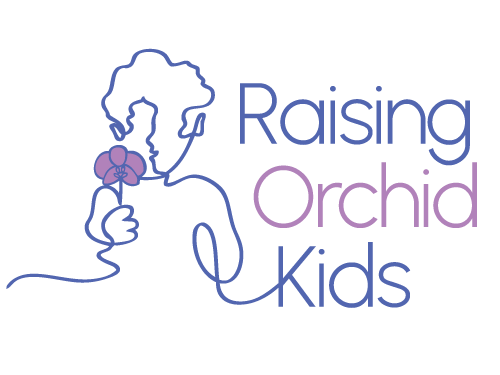Now that we’re settling back into the school rhythm, you might be wondering how best to manage your child’s meltdowns. Do any of these scenarios sound familiar?
You pick up your 2nd grader from school. On the walk to the car, she collapses on the sidewalk in full meltdown mode because the Goldfish you packed are the wrong flavor. Or maybe everything seems fine—until 30 minutes later, at home, she completely unravels when you ask a simple question like, “How was recess today?”
Seen this movie before?
Does it feel like your child saves all their challenging behavior just for you?
We could probably come up with an endless list of things that can trigger these post-school (or post-camp, or post-extracurricular activity) meltdowns. And if you’re parenting an Orchid (aka neurodivergent) kid, you know this all too well.
For some kids, these after-school meltdowns are huge. Long. Loud. Physical. These are your exploders.
For others, the reaction during a meltdown means a total shutdown. They isolate in their rooms, avoid eye contact, and retreat completely. These are your imploders.
Either way, it can leave you, the parent, feeling like you’ve done something terribly wrong every single time they have a meltdown. Perhaps you’ve asked yourself the following questions:
- Why is she so angry with me?
- Why does the teacher say he never has behavior problems at school?
- Why does it feel like I get the angriest version of my kid?
Meltdowns don’t mean you’ve done something wrong
In fact, the opposite is true. They’re not trying to torture you–we promise! Your child has worked incredibly hard all day to keep it together. It’s exhausting for them to spend a whole day masking their discomfort, suppressing their impulses, following rules, staying seated, being quiet, fitting in. All day long, they’ve avoided a meltdown in front of their teachers and peers.
Now that they’re finally with you, they feel safe enough to let it all out.
This isn’t manipulation or punishment. It’s trust.
It’s seriously hard for Orchid kids to just be in a world not designed for the way their brains work. The school environment is highly structured, stimulus-heavy, compliance-driven and is utterly exhausting. Holding it all in takes a toll. And once they’re home, the mask comes off — with a bonus meltdown.
All that work takes a toll on Orchid brains. They need to release all that pent up frustration and unmet sensory needs and whatever else they had to bottle up all day.
Meltdowns that feel personal–but aren’t
It feels like they’re taking it out on you. Then the voices of judgment, both internal and external, start yammering in our brains. Often pretty loud, with thoughts like:
- Children of GOOD parents don’t behave this way.
- They all think I’m a TERRIBLE parent.
- I must be doing something to make this behavior happen.
These are thoughts so many of us have had. But let us break it down for you: Your child’s behavior is not your fault.
If you’ve taken our Practical Strategies class, you might remember this bombshell from Class 2:
You CANNOT control your child’s behavior.
Let’s say that again for the folks in the back: You canNOT control your child’s behavior.
Actually, their behavior is one of the few things they can control in a world in which they wield little power. We can influence behavior before and after, but not in the moment.
Accepting this truth can be a game-changer for keeping yourself calm when your child is melting down. And spoiler alert: staying calm and present when your child is melting down is key to helping them recover.
Five tips to manage meltdowns
If you’re noticing a pattern of after-school meltdowns, here are some things you can try:
1. Track the patterns by asking yourself these questions:
- When do meltdowns tend to start?
- Are they daily or occasional?
- If occasional, are there things that occurred those days that might explain your child’s shorter fuse? Always good to start with the big triggers: are they tired, hungry, sick? Are there specific school events that may have occurred that might feel overwhelming?
2. Ease the transitions with these suggestions:
- A favorite snack (the right flavor of Goldfish this time!)
- A beloved stuffed animal, fidget, or a weighted blanket
- Headphones with their favorite music (or put it on in the car)
- Your dog in the backseat (if you have one!)
- A calming audiobook or story on in the car
- Your open arms – sometimes just a big hug can recharge their battery. For sensory seekers, physical touch releases oxytocin, a soothing hormone that mitigates stress responses, which is what a meltdown is.
- Choose something that feels soothing and grounding for your child.
3. Minimize talking.
Resist the urge to ask questions. Even simple ones like “how was your day?” can feel like demands after a long school day filled with responding to demands from adults. Instead, try:
- “I’m so happy to see you!” Then offer a hug and zip it.
If you must say something about the day, try a low-pressure “I wonder…”
- “I wonder if anything today made you smile.” And then let it go if there’s no response.
4. During the meltdown, say less and soothe more.
When your child is melting down, their brain is offline. They physically cannot process complex language or reasoning. Keep it super simple:
- “I love you.”
- “I’m here.”
- “You’re safe.”
Offer a soothing presence, a hug (if they like that), or a quiet nearby presence if they need space. Minimal words. Maximum calm.
5. Ignore the judgy folks.
People who don’t understand neurodivergence may judge what they see without understanding the context. That’s on them, not you. They have no idea what your child needs to feel safe and soothed. You have full permission to ignore them. And then you can judge them later for being so judgy!
Reframing your child’s meltdowns
It’s hard to be the anchor trying to hold the ship in place when the storm hits and the waves are rough. But you are your child’s safe space. If you can stay calm and grounded when they are melting down, you become the eye of the storm, the safe space in the center when everything else around is swirling out of control.
They don’t need you to fix the meltdown. They need you to ride the wave with them, to help them get to the other side, and be there when it’s over.
When we can better predict the looming storms, we can be better prepared to buttress ourselves to ride it out. And remember to get the right flavor and size of Goldfish!
If you are struggling to manage your child’s challenging behaviors, consider joining our Raising Orchid Kids Practical Strategies class next term.
Let us know how this post landed for you. If you’d like us to write about any specific topics, please share your thoughts by contacting us here.
Photo by Ladislav Stercell on Unsplash

